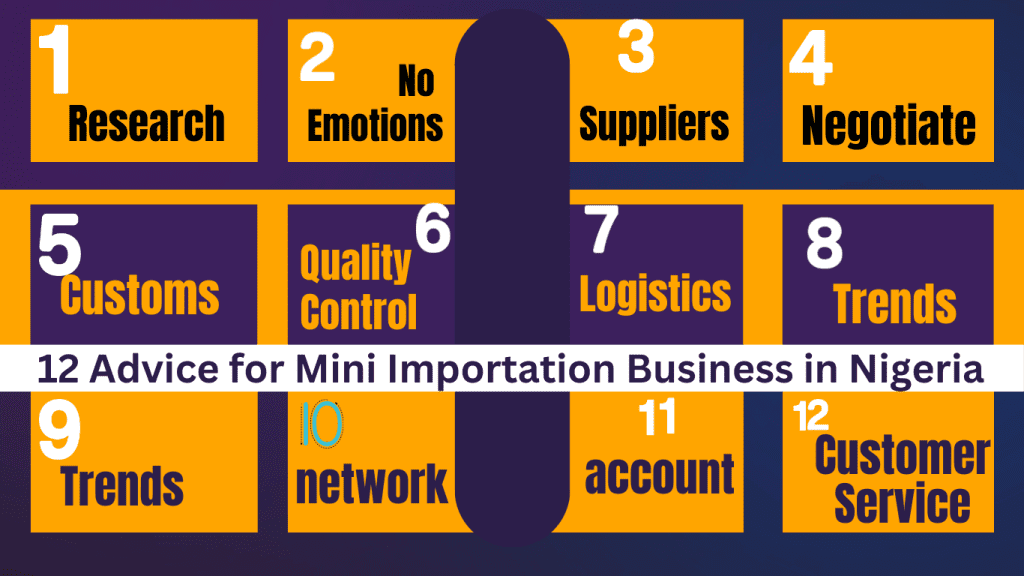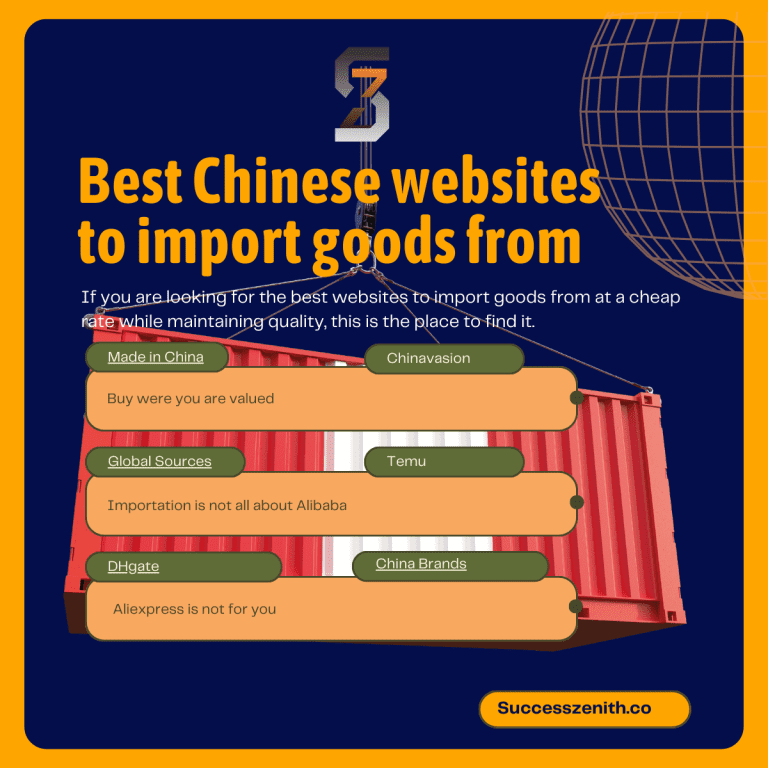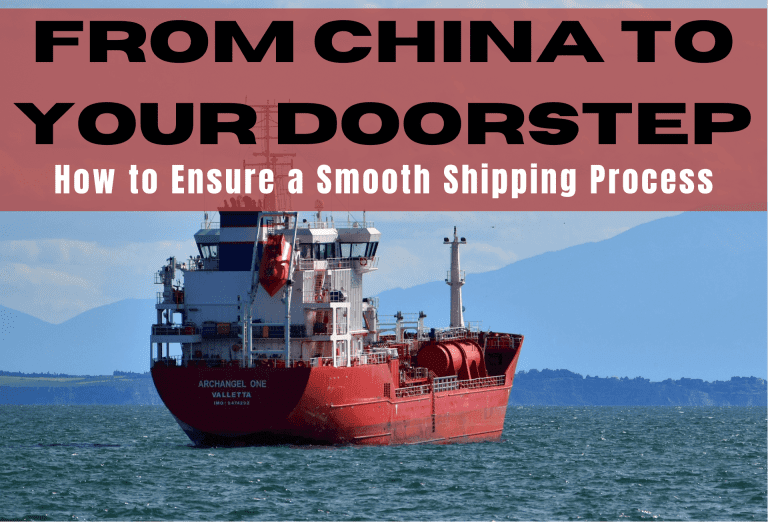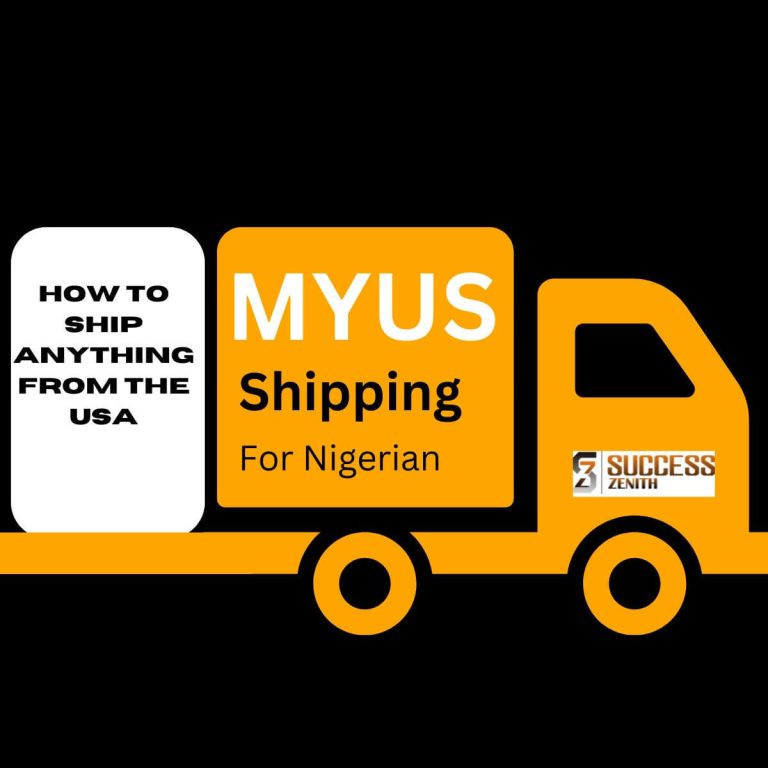Please Follow us on social media >>>>
12 Advice for Mini Importation Business in Nigeria
I have 12 simple advice for you if you are into the Mini importation business.
While the importation business remains one of the few businesses you can start and do in Nigeria with little experience and capital, you still need to be careful as there are a lot of dangers inherent in it.
This article is a continuation of the series on everything you need to know about the mini-importation business in Nigeria and how to succeed.
The mini-importation business in Nigeria comes with its own set of challenges. Many experienced and new importers have tons of questions about how to succeed in mini importation.
Here are 12 essential pieces of advice for mini importers to help you carry out your business of importing goods successfully.

1. Research your market first before you go into the mini-importation business:
Before you start importing goods, first research your target market thoroughly.
Understand the demand for your products, the competition, and any legal or regulatory requirements that may apply.
2. Don’t import goods based on emotions.
No matter how much you love the items you import, always base your decision to import them on solid market data.
China and the rest of Asia has a lot of suppliers and manufacturers to help you import and succeed. Many of them with goods you will somehow want to fall in love with, but please don’t.
Use the information available to you to make the right decision on your importation business,
- Ask yourself: Are people willing to buy this good?
- Is there a market for the item I am importing?
- Do the goods solve real human problems?
- Are there others importing and selling the same things?
- How am I going to sell this product after I import it?
- Are there bigger importers of the same items that I can buy from?
All of these questions will help you remove emotions from your business of importation.
3. Choose the right suppliers:
Finding reliable suppliers is key to a successful import business. Look for suppliers that offer high-quality products, competitive prices, and good customer service.
You should not just buy from anyone you see in a market if you want to succeed in the mini-import business.
Here is why this is important:
1. Quality of Products: Selecting the right suppliers ensures that you are getting high-quality products for your business. Poor-quality products can damage your brand’s reputation and lead to unhappy customers.
2. Reliable Delivery: Working with reliable suppliers means that you can trust them to deliver your products on time.
Timely delivery is essential for meeting the demands of your customers and maintaining a good relationship with them.
3. Cost-effectiveness: Choosing suppliers who offer competitive pricing can help you maximize your profit margins. By negotiating with different suppliers, you can find the best deals for your business.
4. Negotiate terms carefully:
When negotiating with suppliers, pay attention to pricing, payment terms, delivery times, and minimum order quantities.
Make sure to get everything in writing to avoid any misunderstandings.
According to Ashleigh Shelby Rosette; a professor whose research centers on negotiations, you need to get prepared before the negotiation. She said in a podcast hosted by AMY GALLO in the Harvard Business Review: “a good negotiator is a prepared negotiator”
5. Understand customs regulations:
Familiarize yourself with the customs regulations of the countries you are importing goods from and to. Make sure you comply with all import duties, taxes, and regulations to avoid any legal issues.
6. Invest in quality control:
inspect the quality of the goods you are importing before shipping them to ensure they meet your standards. This will help you avoid returns and customer complaints.
There are agencies in Asia that can help you carry out quality control for a fee.
It is best to use a private entity rather than one provided by the supplier, as the latter will tend to be biased.
7. Plan your Mini Importation logistics well:
Logistics can make or break an import business. Make sure you have a reliable shipping partner and a well-organized supply chain to ensure the timely delivery of your goods.
8. Stay on top of trends:
Keep an eye on consumer trends and market developments to stay ahead of the competition.
Adapt your product selection and marketing strategies accordingly to attract more customers.
9. Build a strong network:
Networking is essential for a successful import business.
Connect with other importers, suppliers, and industry experts to exchange valuable insights and opportunities.
If you go to Facebook, there are tons of pages and groups on the subject of mini-importation. Use these to keep yourself in the loop on what’s happening in the mini-importation industry.
10. Manage your finances wisely:
Keep a close eye on your finances and track your expenses carefully.
Set a budget for each import shipment and monitor your cash flow to ensure the profitability of your business.
Also, do not forget to track your marketing and advertising. Many importers forget to account for the money spent in ads.
Choose payment platforms that has a good tariff and exchange rate. This has always been a challenge in countries like Nigeria where foreign and cross border transactions is discouraged.
But with enough research, you can choose the best option to pay your suppliers from your location.
11. Provide excellent customer service:
Customer satisfaction is key to the success of any business. Offer responsive customer service, handle inquiries and complaints promptly, and strive to exceed your customers’ expectations.
12. Get a separate bank account for your importation business:
Have a dedicated bank account to handle anything related to your importation business.
This way, it will be easier for you to track your progress, profit, and loss.
By following these 12 pieces of advice, you can overcome the challenges of importing goods successfully and build a profitable import business.
With the right strategies and a proactive approach, you can take your import business to new heights.
My name is Echez, and I help small businesses like yours import, pay foreign vendors and suppliers, and also market through social media advertising.









